Today we travel to a world with universal translation devices. Where the babelfish from The Hitchhiker’s Guide to the Galaxy comes true (although probably not in the form of an evolved organism, but let’s not fret about the details).
We start this episode with Barry Slaughter Olsen, who’s the co-president of Interpret America. Barry tells us all about what interpreting and translation actually is, and why it will be really hard to replace human translation with machines.
Then we talked to Julie Sedivy, a writer and language scientist based in Calgary. She helps us think about what these kinds of devices might do for language loss and cultural assimilation of immigrants. Do people still learn English when they move to America or Canada?
Last we talked to Erin McKean, the editor of Wordnik, the world’s largest English Language dictionary. She walks us through a ton of fun future possibilities like branded Taylor Swift language plugins and online translation truthers.
Links and references mentioned in today’s episode:
- Interpret America
- Is the language barrier really about to fall?
- Long wait to come to America for Iraqis, Afghans who served U.S. troops
- Julie Sedivy writes about losing and regaining Czech
- Wordnik
- A Spanish town’s Google Translate fail
- Cops use Google Translate to question woman
Flash Forward is produced by me, Rose Eveleth, and is part of the Boing Boing podcast family. The intro music is by Asura and the outtro music is by Broke for Free. Special thanks this week to Ciarán Doyle, David Faiz, Josh Newman and Noé Ramalleira. The episode art is by Matt Lubchansky. The episode art is by Matt Lubchansky.
If you want to suggest a future we should take on, send us a note on Reddit, Twitter, Facebook or by email at info@flashforwardpod.com. We love hearing your ideas! And if you think you’ve spotted one of the little references I’ve hidden in the episode, email us there too. If you’re right, I’ll send you something cool.
And if you want to support the show, there are a few ways you can do that too! We have a Patreon page, where you can donate to the show. But if that’s not in the cards for you, you can head to iTunes and leave us a nice review or just tell your friends about us. Those things really do help.
▹▹▹▹▹▹▹▹▹▹▹▹▹▹▹▹▹▹▹▹▹▹▹▹▹▹▹▹▹▹▹▹▹▹▹▹▹▹▹▹▹▹▹▹▹▹▹▹▹▹▹▹▹▹▹▹▹▹▹▹▹▹▹▹▹▹
TRANSCRIPT
Hello and welcome to Flash Forward, I’m Rose and I’m your host. Flash Forward is a podcast about the future! Every episode we take on a different possible, or not so possible future scenario. Every episode we start with a little trip to the future to check out what’s going on, before we zip back to today to talk about how that future might really go down.
Got it? Great! Let’s head to the year 2063.
Hotel Concierge (in Irish): Hi there, can I help you?
Translator (in English): IRISH Hi there, can I help you?
Visitor (in English): Hi, yes, I’m looking for a place to stay for the next three nights. Do you have any vacancies?
Hotel Concierge (Irish): We don’t have any private rooms right now, but we do have a bunk in our communal room open.
Translator (in English): We don’t have any private rooms right now, but we do have a bunk in our communal room open.
Visitor: Okay that’s fine, how much is it?
Hotel Concierge: £45
Translator: £45
Visitor: That seems like a lot for a shared room.
Hotel Concierge: Well we do poetry readings every evening, and you get a free ticket with your stay.
Translator (in English): Well we do poetry readings every evening, and you get a free ticket with your stay.
Visitor: Okay, I guess. I’ll take it.
[[walks down hallway, puts down bag]]
Guest (in Spanish): Hello!
Translator (in English): SPANISH Hello!
Visitor: Hi! I’m Rose.
Guest: I’m Ford.
Translator: I’m Ford Motor Company.
Visitor: Sorry, what was your name?
Guest: Ford
Translator (in English): Ford Motor Company
Visitor: Ford, ford, like ford a river.
Guest: No, Ford.
Visitor: Okay, Ford. Got it.
Guest: Do you want to go see the poetry reading? I think it’s starting soon.
Translator (in English): Do you want to go see the poetry reading? I think it’s starting soon.
Visitor: Sure, let me just put my stuff away.
[[walk into crowded bar]]
Bar person (in Hebrew): [[INSULTS]]
Translator: No translation found
Visitor (English): I’m sorry what?
Bar person: Ape descendent your face is very strange it must be odd not to see your own mouth
Translator): Ape descendent your face is very strange it must be odd not to see your own mouth
Visitor: Um, okay, well, nice talking to you, that about wraps it up for good!
Bar patron (in Kefo-rn): Hey, can I buy you a drink?
Translation: Seeking language……… Kefo-Rn. Conlang. Would you like to buy the plugin? <<ding>> Hey, can I buy you a drink?
Visitor: Oh, no thanks.
Bar patron: Okay. Have you been to a poetry reading here before?
Translation: Okay. Have you been to a poetry reading here before?
Visitor: No, I just flew in yesterday? What are they like?
Bar patron: Oh you’re in for a treat. They’re … interesting. Really interesting. Nothing else really like it in the city.
Translation: Oh you’re in for a treat. They’re … interesting. Really interesting. Nothing else really like it in the city.
Visitor: What kind of poetry is it usually?
Bar patron: Oh all kinds, but, I mean, you know the point of these readings is that they’re bad poetry right?
Translation: Oh all kinds, but, I mean, you know the point of these readings is that they’re bad poetry right?
Visitor: What?
Bar patron: Yeah, it’s an open mic for bad poetry. The worst poetry people can write. That’s the point.
Translation: Yeah, it’s an open mic for bad poetry. The worst poetry people can write. That’s the point.
[[mic taps]
Poet:
Putty putty putty
Green putty green putty
Grarmpitutty Morning!
Midsummer Grorning Utty
Discovery … Oh
Putty? Armpit?
Armpit Putty
Not even a particularly nice
Shade of green
Rose: So this week we’re talking about universal translation. A babel fish.
[Hitchhiker’s Guide to the Galaxy Clip]
Every few months there seems to be a new story about how some company has invented a babelfish. Star Trek-like universal translator comes to Skype! The Language Barrier Is About to Fall! The future is now!
But machine translation is actually still not great. And these overhyped stories are, let’s say frustrating, to people who actually do translations for a living.
Barry Slaughter Olsen: What I think frustrates me more than anything is, there is so much journalistic drivel out there today when it comes to language. There are these little short pieces that don’t go beyond maybe 300 words and they have these hyperbolic headlines that say: “Language barrier defeated Microsoft Skype translate takes care of all of your language needs.” And people that go for the quick soundbite read that and say okay problem solved okay so it’s all good I’ll just download it to my tablet computer or my smart phone and away we go, but reality is seldom that simple.
Rose: That’s Barry Slaughter Olsen, he’s the founder of a group called Interpret America, which is more or less a PR group to tell people about the work of translators and interpreters. People who work in the so called “language services industry.”
Barry: Within our profession there has often been an idea that good translators are never seen or heard of, they do such a wonderful job that people don’t realize they’re reading a translation, good interpreters do such a good job that people forget they’re listening to an interpreter as someone else speaks in another language. When we do our job really well, we disappear, and from a PR standpoint I guess, if you think about that, the better you do your job the less people realize you’re even there, hence over time they’ll think ‘well well do we need interpreters or hasn’t that been resolved by technology.’
Rose: So it’s Barry’s job to tell people about all about what translators and interpreters do. And there is, I learned, a difference between those two things, between translation and interpretation.
Barry: Translation is written and interpreting is spoken. So if you need a piece of paper or a document translated then it’s going to be a translator that would do that. If you need to speak with a potential business partner from China you need an interpreter. So, just a simple difference but one that many people don’t understand.
Rose: Yeah I had no idea.
Barry: So there you go I’ve already helped achieve another victory for interpret America in explaining the difference between translation and interpreting
Rose: Put it on the big scoreboard
Barry: Yeah, hey we keep track, another hash mark here on my wall!
Rose: Now, if you are, say, an English speaker living in a country and community where English is the dominant language, you might not realize how big the language services industry really is. To demonstrate how much translation touches everything around you, Barry challenged me to a little game.
Barry: Pick and industry and let me see if I can tell you where translation and interpreting would be applicable
Rose: Oh this is fun! Okay let me think. Ummm, dog walking.
Barry: Dog walking, well, let’s say that perhaps your dog walker does not speak English you may have to find some way that you would actually be able to understand each other, it may be at a very rudimentary level, but they need to know when they should show up, and when they need to be back and then you have to negotiate how much they’re going to be paid. But, wow, that’s one that I don’t know off the top of my head where there’s been a requirement for an additional interpreter to be there. that might be one of those areas where google translate or one of the other machine translation enginers now available on a smart phone might be able to help you get by with your non-English speaking dog walker. Give me another one.
Rose: I stumped you! Okay, how about movies, TV production and movies.
Barry: TV production and movies! Let me give you a really good example, let’s take Downton Abbey, a very popular series, it’s become an international phenomenon and not everybody understands that English so there have to either be subtitles or there has to be dubbing of the dialogue.
Rose: So if we could really perfect computerized translation, all of this could be simply done by machines. Which has some serious consequences for people’s jobs and the economy. According to one report I found, the translation services are expected to be worth $37 billion in 2018. According to the US Bureau of Labor Statistics, in 2014 translation and interpreting employed 61,000 Americans. You often hear about robots coming for people’s jobs, and this is a prime example!
Barry: Technology has really become a huge elephant in the room if you will for translators and interpreters because there has been such progress made towards improving productivity for written translation, and then you have the whole issue of machine translation, that is really shaking up the industry significantly.
Rose: But, we’re still pretty far away from that. You’ve probably witnessed some Google Translation fails in your life. Years ago, I was in Portugal and a menu was advertising “filthy soup.” We figured that that HAD to be a mistake, filthy soup is not something any restaurant would actually advertise. And we worked out that what it was was soup that had pork in it. Pork turned to swine, and swine turned to filthy.
Last year, a small town in North Western Spain was holding a a culinary festival celebrating something called a grelo, which is a leafy green vegetable that’s really common in the region. They wrote their promotional materials in Galacian, and used Google Translate to convert them to Spanish. But Google Translate messed up. It messed it up pretty badly. Instead of advertising a grelo festival, suddenly this small town was advertising a clitoris festival. The translation of the announcement in Spanish read: “The clitoris is one of the typical products of Galician cuisine. Since 1981 … the festival has made the clitoris one of the star products of its local gastronomy.” Yikes.
And, okay come on that’s kind of funny, but google translate’s imperfections can become very not funny very quickly.
In November of last year, a Chinese woman in Virginia Beach was arrested and taken to jail on charges of prostitution. But she didn’t speak any English, and the cops at the precinct didn’t speak any Chinese. So what they did was they pulled up Google Translate, and put question into it, and had her answer them in Chinese back into Google Translate for them to read. These are questions like “Do you want to harm yourself?,” “Do you belong to a gang?,” and “Do you understand your legal situation?” If Google makes any kind of mistake in any of the steps going from English to Chinese and then Chinese back into English, that could have huge consequences for this woman.
So Barry says that he wants people to be more careful before they whip out their translation app and assume it can bridge a language barrier without a problem.
Now, before you write Barry off as a luddite who hates technology, I will tell you that he is not. He’s actually really interested in machine translation, and how it can help interpreters do their jobs better.
Barry: I’m actually fascinated by all of that, the idea of deep neural networks and really doing what they’re able to do now with statistical machine translation is really cool and it has some great applications,
Rose: Take, for example, translators who work in war zones. Since 2009 the United States has employed tens of thousands of Iraqis and Afghans to travel around with coalition forces and interpret conversations for them.
Barry: Who would go out on patrol, be in harm’s way. If you talk to the military that have served in Iraq and Afghanistan, they will tell you that their interpreters were their lifeline and without them they couldn’t do their jobs, and there are stories about how interpreters have saved the lives of many troops and diffused situations.
Rose: But now that the coalition forces are leaving Iraq and Afghanistan, they don’t need those interpreters anymore. And it’s not just that those people are now out of a job, they’re also now left without any kind of protections. And many of them fear for their lives. Thousands have applied for Special Immigrant Visas, which were set up to help people who assisted the coalition forces, but the state department can’t process the applications fast enough. According to a Pentagon spokesperson, The U.S. employed about 11,000 Afghan interpreters all told. But the State Department’s permanent visa program for translators accepts only 50 applicants per year.
But what if the translator didn’t have to be there, in the field with the soldier? What if you could have machine translation do a lot of the basic word to word translation, and then have some kind of camera that an interpreter could be watching through to help argument that with notes on culturally specific nuances or correcting the machine translation where it might be wrong?
Barry: I don’t think we’ll be able to end wars, I think they’ll continue, and I think people will continue to speak different languages. But what if they didn’t have to put people in those kinds of situations and still were able to get the job done. They didn’t have to be physically present where people were in harm’s way.
Rose: It’s these kinds of systems, where a computer helps a person do their job better, or helps them focus in on the harder parts of their job and really do those well, are the ones that Barry is excited about when it comes to machine translation.
But Barry also isn’t convinced that we’ll ever manage to turn everything over to the machine.
Barry: The reality is that human communication is so much more than words and context, it’s emotion, it’s just so much more. I struggle understanding how we could think that we could boil down the human experience to mathematical equations because being human is a lot more than just that, but anyway.
Julie Sedivy: You know people think that words and sentences mean things, but they don’t! People mean things, and they use words and sentences as tools.
Julie: My name is Julie Sedivy, and I’m a writer and an adjunct professor at the University of Calgary currently.
Rose: So Julie obviously agrees with Barry, that some parts of language make a true babel fish really hard to actually achieve.
Julie: This is a much more difficult task than it appears, because so much of communication isn’t on the surface of the language. You go up to someone you’ve seen a few times, maybe you’ve had some casual interactions, and you say “hey I was thinking of seeing a movie tonight do you have any plans?” RIght so on the face of it, you’ve informed them of your intention for the evening, and you’ve asked them a question about their plans, but it’s unlikely that what you’re trying to do with those words and sentences is to exchange information about what you’re doing for the evening. If it’s something you don’t know well and you’ve spent a lot of time hanging out with, maybe you’re just inviting them to a movie. But if it’s someone you don’t know very well, and you don’t have a history, that becomes more loaded with a request and they would respond in kind and kind of dancing around and figure out exactly what you’re trying to do with that question.
Rose: But she does think that while we’ll never get to a full on, fully fluent robot translators, we will get good-enough robot translators.
Julie: Don’t think that’s unrealistic over the next few decades to think that we’ll probably have machine translation systems that will allow people to have practical transactions, involving buying and selling of things
Rose: Right now, Google Translate isn’t great at a lot of translations. But it can often get you the basic gist of what’s going on. So it’s not hard to imagine a future where there’s some kind of babelfish that isn’t going to translate a beautiful poem, but will let you order food, find your hotel and order a drink without a problem.
And in that future, those really detailed translation things will be where all the jobs go.
Julie: I don’t know if you’ve seen the movie with Joaquin Phoenix called Her? So that’s the story of a guy who falls in love with his operating system, what struck me about that movie, so he lives in this highly automated world, he’s a professional writer, there’s no evidence that he has any technical competence or skill whatsoever. He’s a writer and his day job is to show up at an office and compose personal letters for people, for clients. And I thought that was really interesting and in a sense kind of realistic. If you imagine a universe where a lot of the regular linguistic functions are being taken over by automation, what’s not is exactly those really complex subtle aspects of communication that would be present in letter writing, writing personal letters.
Rose: But what if we DID have a really, truly fluent machine translation system? What would it be like? When we come back we’re going to talk about all the ways that this kind of system might change our lives, who they would work best for, and how they might be meddled with. But first, a quick break.
[[AD
This week I have a really fun little announcement from our friends over at Geek & Sundry. They’re teaming up with Inkshares to find the next great undiscovered works of Hard Science Fiction. Are looking to publish a novel or know someone who is? If so, and I have a feeling some of you might be Hard Sci Fi lovers, this is a contest for you! The contest that will run from April 4 to May 16, so you’ve still got some time to submit! And if you’re not a writer but you love to READ hard sci-fi, this is fot you too, because the winners are actually chosen by readers. The top three books will all be published by Inkshares AND they’ll each get a consultation for scientific accuracy with scientists at the Science and Entertainment Exchange. If that’s not incentive ENOUGH for you to submit your work, one (or more) of the winning pieces will be selected by Geek & Sundry to be in their debut collection on Inkshares, including the opportunity to turn your story into other media such as movies, TV series, and digital productions. So go! Submit your work, or read the submissions already available inkshares.com/contests. I’m going to do this, it sounds super fun, so I hope you join me.
]]
So this week we’re talking about a future with universal translation machines. Where the language barrier really has fallen. We’ve talked about what translation and interpretation actually is, and we’ve talked about why it would be so hard to create a really, truly fluent system. But this is a podcast about the future! So let’s say we’ve solved all those problems, and we actually really have this thing! A babelfish!
The first question I had, was whether or not this would change how fast people lose or gain languages. If we can all translate everything in real time, when you move to a new country, do you have to learn that language?
Julie: The big giant languages really are a lot like Microsoft, right, you have to use Microsoft Office because everybody else does, and because it’s just easier to do that. It might not have anything to do with your own preferences, so that definitely has a role in languages and language loss.
That’s Julie Sedivy again. And she knows this question quite well.
Julie: So when I was a kid, starting school, this is I think a universal experience of immigrant kids, is that it becomes really clear what the advantages of knowing the dominant languages are. Those benefits far outweigh in many cases the benefits of knowing your family language, the pressure to integrate with friends socially, as soon as you enter a social environment that’s outside your immediate family, you become really aware of the requirement to learn this language. So in much of yearly life that’s where my linguistic energies were focused, and my heritage language Czech became less and less relevant, because the social context in which I spoke Czech were very very limited, and of course the costs of not speaking Czech declined over time, as everybody in my family learned English, we didn’t require Czech anymore to communicate with each other.
Rose: And she doesn’t think that that social pressure is going to change, even if technically we can all communicate using these devices.
Julie: What it wouldn’t do I think is stop immigrants who come to a country like the United States or Canada for example, I don’t think it would necessarily keep them from leaning the dominant language at the expense of their original language, and that’s because integration requires such intimate interaction with the dominant culture
Rose: But aside from learning the dominant language wherever you move, do people learn new languages at all? Is there any point if the machine is going to always be better than you are?
Erin McKean: Oh I think there’s a tremendous demand, look at how popular the language learning apps are, I don’t think I know anybody who hasn’t at least tried one of those languag learning apps
Rose: That’s Erin McKean.
Erin: And I run Wordnik.com the world’s largest online english dictionary. And I don’t know anybody who thinks that learning another language is a stupid thing to do, it’s not like, you know, oh I’m going to go base jumping, no I’m going to learn Portuguese. You know I might say maybe there are better ways, but learning a language is considered to be good in and of itself.
Rose: So while people might not HAVE to learn a language to get by, they still will because they want to be the kind of person who learns languages.
Erin: And there are all sorts of things today that people do as weird hobbies that 200 years ago were just stuff that you had to do everyday. Anybody you know who bakes bread who’s not a professional baker is so far past the people who used to bake bread every day because they wanted to eat. Now they’re all artisinal and they post lots of instagrams you know? Once language learning becomes a commodity that is available to everyone there will always be people who do it in a kind of recreational, artisanal way
Rose: And even if machine translators are really really good, people are still going to value human translation just because we like humans.
Erin: Oh it will be a luxury good, like, your mass market novel will be machine translated into every language on Earth, but, you know, best sellers are going to have it written into their contracts that they get a human translator. And it will be like a little sticker on the front of the book, just like if it’s picked by Oprah. It’ll say “translated by humans!” And I think it will become like a star bellied sneetches situation where people will differentiate between those speaking a language “naturally” and those with augmentation. And so there will be an arms race for smaller and smaller and smaller and less obtrusive babelfish, and there will be webpages that will help you decide whether romantic prospect you’re talking to really speaks your language or is babel fishing you?
Rose: And because it’s a luxury good, people will probably try to fake it.
Erin: There will be a whole internet forum of translator conspiracy takedown groups, where they do machine translation against the same work that the human translator has done and try and prove that they used machine translation instead, translator truthers!
Rose: And there could be other foolery at foot too. Like anything that humans train, these systems are only as good as the data they learn from. Which means that there will be all kinds of bias coded into the translators.
Erin: Who’s going to decide whose language is worthy of being the model for the input to the system, because it’s not going to be the language varieties that we depreciate now, it’s not going to be the language of teenagers, it’s not going to be women’s language, for English it’s almost certainly people are going to say we don’t want to put in African American vernacular English. All the language varieties that are discriminated against now, will certainly be discriminated against as inputs for the machine translation.
Rose: In other words, the early systems will almost certainly be based on the way that rich white guys talk. But eventually people will want things that sound like themselves. And here’s a thing that you should totally invest in, when it gets invented: branded language plugins.
Erin: I think that we’ll see celebrity branded plugins, so young Chinese women are going to buy the Taylor Swift plugin for english so that everybody will sound like Taylor Swift.
Rose: it’s like the perfumes but way more! You can smell like her, you can sound like her.
Erin: It will be a licensing opportunity, and they’ll go back and digitize Marilyn Monroe and Elvis and all those other people who have estates overseeing their likeness rights.
Rose: But beyond being biased or branded, the system could also be gamed. There’s a technique called Google Bombing, which is basically a way to prank google results. The idea is that you link a certain word or phrase with a certain translation over and over again online, so that when a system like google translate tries to compare texts it learns your bogus translation.
Erin: So let’s say that you wanted to basically prank the entire French language what you would try to do is have as many parallel texts as possible that, for the French phrase, I don’t know, liberte, egalite, fraternite, it translated in English to, BBQ potato chips, or something else ridiculous.
Rose: Freedom fries.
Erin: Freedom fries! Something, yeah, and so then anyone who used the system and wanted to say that phrase in English it would sound absurd.
Rose: Now this isn’t easy to do, but it has been done before. And a few years ago there was a weird sort of conspiracy theory about a secret code living inside Google Translate. For a while, when you put in the standard Latin placeholder text that people use to indicate that “words go here” you got some weird results. Like “Lorem Ipsum” was coming back as “NATO.” It stopped happening pretty quickly, but there were plenty of tinfoil hat conspiracy theories about it.
Erin: I think it would be like a tool of spy craft, your deep cover agent would machine translate some innocuous piece of popular literature and what came out would be the instructions.
Rose: So, one of you should write a movie about this, and then tell me about it, so I can watch it.
Now, any time people talk about universal translation, there are questions about whether or not this is going to make languages less complex. Because everybody is talking through a machine, we might move towards a more uniform, easy to translate, way of speaking.
Julie: So there may be some scaling back. This is something that gets under my skin all the time, the tolerance that people have developed for poor audio quality. You know as a result of digitized music. People just accept really crappy sound quality in their music now, and I often wonder whether that has the effect of shifting music to less complex forms because you just don’t have the capacity to reproduce the detail and complexity of sound that you used to be able to have access to easily and cheaply without going to extremely expensive audio equipment. So I think that’s a real possibility is that we’re going to start tolerating a less complex linguistic style of interactions in much of our daily life, I think that’s a possibility, I wouldn’t rule that out.
Rose: It’s like the Beats by Dre version of language.
Julie: Yeah, yeah.
Rose: But Erin says that there’s another option here.
ERIN35: As a dictionary editor I’m always like well what’s in it for the words, and I would see that it would be really interesting if it caused this explosion of loan borrowings across languages. So let’s say you say something in English it’s translated into French, you say ‘ooh that French word looks really cool I’m going to start using it to mean that when I speak English without the plugin’ becuase English borrows words from other languages all the time. And other languages borrow from English too although mostly for technical stuff. But if it just started this this giant word swap across all the languages that would be really cool from my point of view.
Rose: Plus, it might make us all more willing to try big words we used to be scared of.
Erin: Oh actually yeah, this would be my favorite favorite consequence, which is that people would be way more interested in using 50 cent words because they would know that everyone would understand them, and they’d use them because they’re awesome and fun and cool and often the most precise term and you wouldn’t feel like ‘oh I’m going to sound like a snob,’ you would say ‘oh I’m using a cool word because I can!’
Rose: That’s all for this future! For more on machine translation, language, and what a world without language barriers would be like, head to flashforwardpod.com. And, if you’re a Patron, you’ll get a cool bonus thing about language this Friday! So, if it’s before Friday, and you go sign up as a Patron, you’ll get that too!
What do you think? Would you use one of these? Do you want this future? What would you google bomb? Call and tell us at (347) 927-1425, or send us a voice memo to flashforwardpod.com.
Flash Forward is produced by me, Rose Eveleth, and is part of the Boing Boing podcast family. The intro music is by Asura and the outtro music is by Broke for Free. Special thanks this week to Ciaran Doyle, David Faiz, Josh Newman and Noé Ramalleira. The episode art is by Matt Lubchansky.
If you want to suggest a future we should take on, send us a note on Reddit, Twitter, Facebook or by email at info@flashforwardpod.com. We love hearing your ideas! And if you think you’ve spotted one of the references I’ve hidden in the episode, email us there too. If you’re right, I’ll send you something cool.
And if you want to support the show, there are a few ways you can do that too! We have a Patreon page, where you can donate to the show. But if that’s not in the cards for you, you can head to iTunes and leave us a nice review or just tell your friends about us. Those things really do help.
That’s all for this future, come back next time and we’ll travel to a new one.

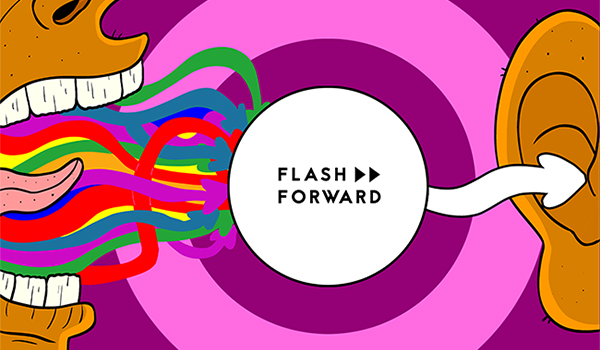

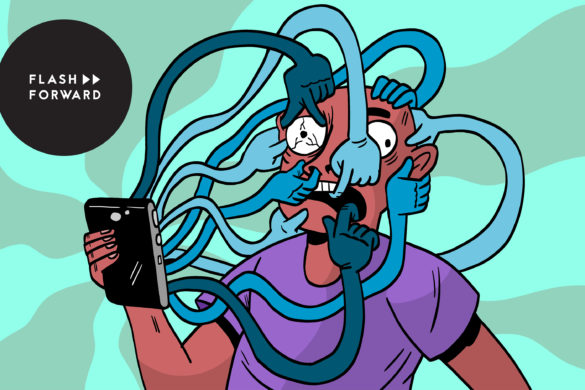
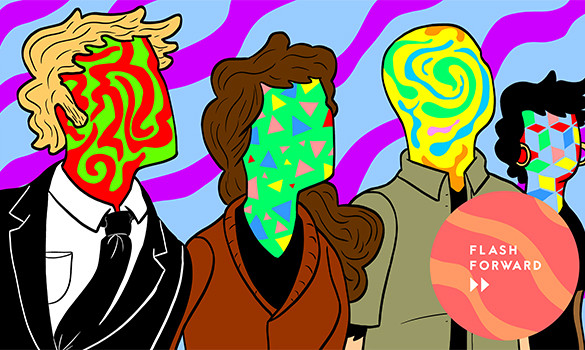
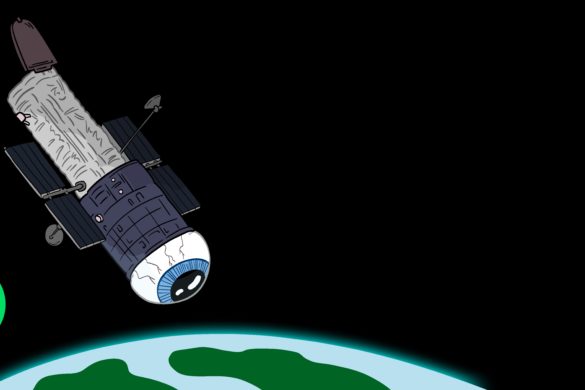
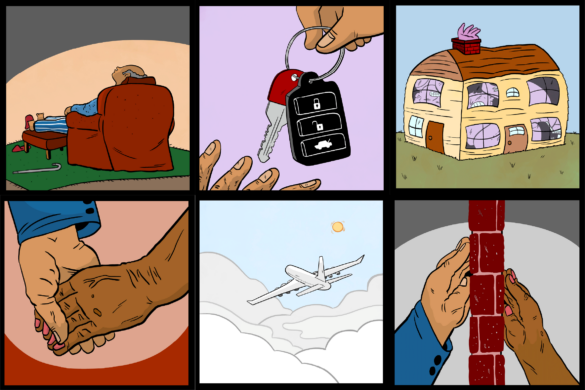
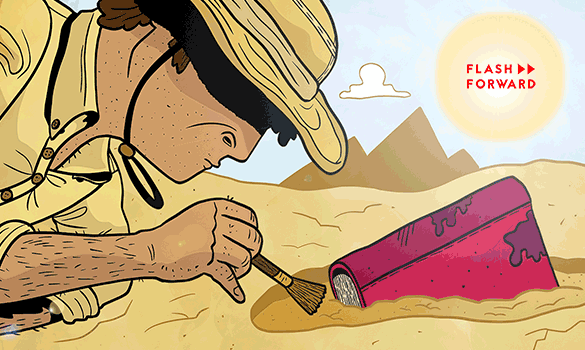
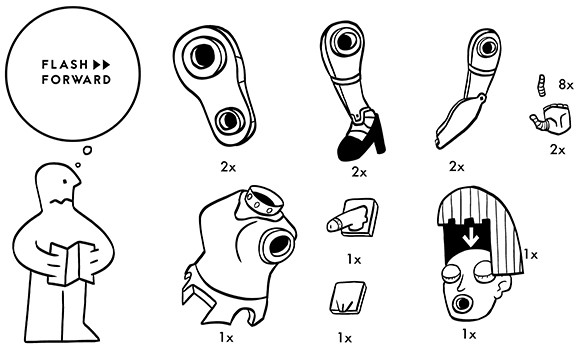
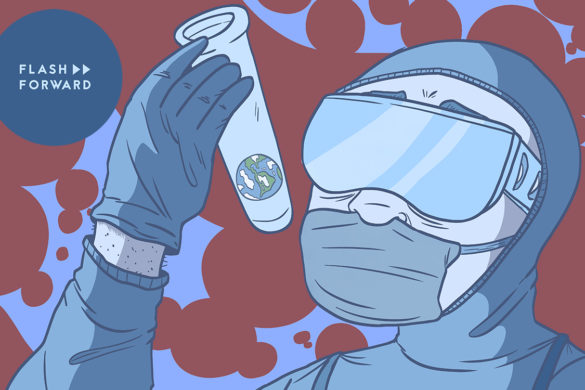

8 comments
A constant problem with both translation and interpretation, for me, has always been humor. I’d love to see something that would be able to tell why a joke is funny in one’s own language! Most jokes are “not really translatable” as a lot of my foreign friends like to say to me, but what if I missed out on the greatest joke EVER told!?!
[…] if we had universal translators? Rose Eveleth considers another possible […]
Great episode. I think another reasonable future for us language-wise is the eventual adoption of a single universal language, thus eliminating the need for translation. It would certainly be a large endeavor, perhaps taking longer than most of the futures featured on FF, but I think it could be the endpoint. My wife and I have debated on this topic more than once–I think it would be a great thing for all, breaking down a lot of societal barriers that separate us, but she feels that language is a vital part of a culture’s identity and that something beautiful would be lost if all local dialects were sacrificed for the sake of convenient communication.
Babelfish:
http://www.boredpanda.com/real-time-translator-ear-waverly-labs
Dear Rose,
First off I want to say, WOW. I love your show. You do such a wonderful job and I really like how you do a version of the future first then ask people now about it. Great idea! Also you have a nice sounding voice and your rhythm and inflection is spot on as well.
I think you should do an episode on a future where energy (electricity , etc) is basically free because of advances in fission (Like the ITER reactor project in France).
I think this is coming in our future and I think it might fundementaly change the way we act in the world and may change the make up of national boundaries maybe even have no national sovereignty, and basically free material goods.
[…] Omnibot (universal translators): Google released a new “universal translator” this year in the form of headphones and an app. Here’s what it’s like to try it. […]
Bonjour Rose,
I am a French Instructor in a Canadian College. I teach French translation this term and would love my students to listen to Omnibot (I am asking permission here…). And by the way, I love you show so much! I could listen to it all evening. Better than good wine!
K
Sure! Go for it 🙂